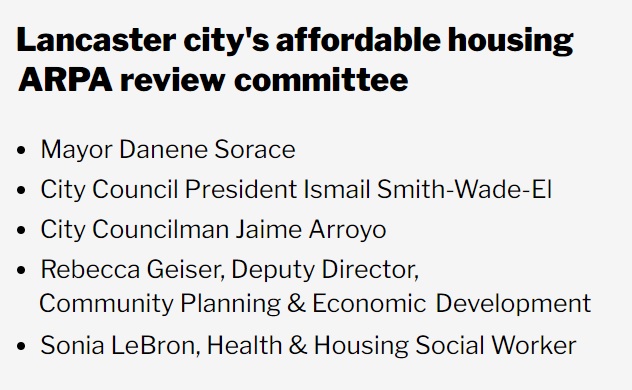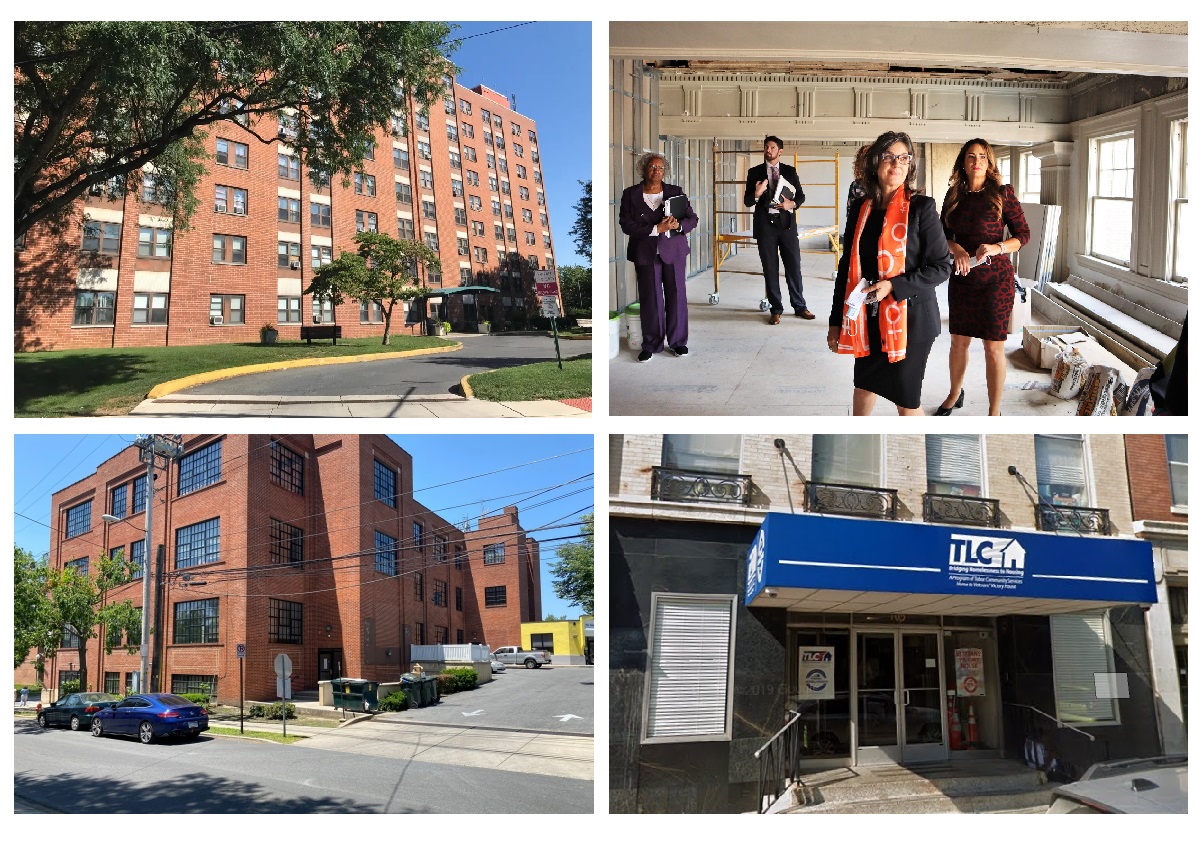City Council on Tuesday unveiled legislation that would allocate $7.4 million to nine local organizations to build or renovate affordable housing, advancing one of City Hall’s top policy priorities.
The bill is on the agenda to be introduced at City Council’s next meeting, which was moved from Tuesday to Monday so as not to conflict with Election Day. That would set up a vote at council’s second meeting of the month on Nov. 22.
The money would contribute toward the construction of 85 new units and the preservation of another 443 units. The funding would come from Lancaster’s American Rescue Plan Act allocation.
Last year, City Council passed a bill reserving $5 million from ARPA for affordable housing, the largest such allocation in city history. It immediately spent just under $1 million of that to buy a property on Marietta Avenue near the St. Joseph hospital campus for development by the nonprofit HDC MidAtlantic.
The bill discussed Tuesday would spend the remaining $4 million and reserve another $5 million from ARPA for affordable housing. It would spend $3.4 million of that, for a total of $7.4 million, or $8.4 million with the inclusion of the Marietta Avenue purchase.
The specific allocations are as follows:
For new construction
- SDL Devco: $2 million (45 units) To incorporate affordable housing into the planned 560-unit Stockyards project. SDL Devco is led by Ben Lesher, who developed Stadium Row.
- Chestnut Housing Corp.: $550,000 (8 units) For the restoration and remodeling of 607-609 Rockland Ave. into affordable housing. Chestnut Housing Corp. is a nonprofit affiliate of East Chestnut Street Mennonite Church.
- YWCA Lancaster: $500,000 (16 units) For renovations to add transitional living units at YWCA Lancaster’s 110 N. Lime St. headquarters
- Community Basics: $500,000 (9 units) For a project to build transitional housing with supportive services at 759 Manor St. for homeless young adults and youths aging out of foster care.
- Lancaster-Lebanon Habitat for Humanity: $450,000 (7 units) To build owner-occupied housing at 913 Wheatland Ave. and to restore properties on Fremont, Poplar and St. Joseph streets.
TOTAL: $4 million
For renovation and rehabilitation
- Lancaster City Housing Authority: $1.05 million (270 units): For renovations including a roof replacement and new HVAC.
- Tenfold: $1 million (46 units) For renovation of the 52-room Transitional Living Center at 105 E. King St.
- SACA Development Corp.: $850,000 (30 units) For renovation of housing at the General Cigar Place property at 453 S. Lime St. SACA Development Corp. is an affiliate of the Spanish American Civic Association
- Partners With Purpose: $500,000 (97 units) For renovation of the “scattered site” units that Partners With Purpose is taking over from the Lancaster City Housing Authority, its parent entity.
TOTAL: $3.4 million
The nine organizations were selected from the 13 respondents to the request for proposals for ARPA-supported affordable housing projects that the city released in June. In all, the 13 applicants requested $15.9 million, City Councilman Jaime Arroyo said.

A review committee evaluated the applications, weighing factors such as the number of units, the amount of other funding being leveraged, the organization’s ability to follow through and complete the project on time, and compatibility with the city’s housing strategy.
“I believe that getting 85 total units for an investment of $4 million …. is something we should feel quite proud of, as well as preserving an additional 443 total units,” Mayor Danene Sorace said.
All the organizations will be bringing in other funding. Tenfold’s total project budget, for example, is around $9 million, CEO Shelby Nauman said.

Nauman said the planned repairs at the Transitional Living Center, or TLC, are critical and long-overdue. They include all-new plumbing and electrical systems, reconfiguration of the entrance to make it handicapped-accessible and installation of a large, modern elevator.
Renovations are equally essential at the Lancaster City Housing Authority, said its executive director, Barbara Wilson. The authority receives some annual federal funding for maintenance, but far too little to make the repairs it has needed to make for decades, she said: The roof at Farnum Street East is “beyond repair,” while the heating system at Church Street Towers is outdated, inefficient and unable to handle rapid temperature swings.

The authority expects to complete the handoff of its “scattered site” units to Partners With Purpose by the end of the month, and the ARPA funding will help ensure that they, too, can be spruced up and kept in good condition, Wilson said.
Wilson set up Partners With Purpose with City Councilwoman Katie Walsh, who is the authority’s director of strategic initiatives. It is essentially a means to offset the authority’s chronic underfunding; as a nonprofit, Partners With Purpose can apply for grants and other funding that the authority is barred from seeking.
Community Basics is partnering with youth shelter nonprofit Valley Youth House for its project, which has an estimated cost of $2.5 million, Executive Director Lisa Greener said. It will provide a much-needed bridge to help at-risk young people navigate the path to a self-sufficient adulthood, Greener said.
Four of the projects are seeking ARPA money from county government, too. Tenfold has requested $500,000; YWCA Lancaster has requested $2.5 million for its overall renovation project; SDL Devco is requesting $3 million; and Partners With Purpose is requesting $500,000. All four requests are pending.
A city-county partnership
The proposed bill would leave $1.6 million of the $10 million ARPA housing allocation unspent. Arroyo said the review committee proposes allocating it to the Lancaster County Continuum of Care, the consortium that provides coordinated homelessness services countywide.
Possible uses could include expanding shelter capacity and paying expenses not covered through other funding streams, Sorace said.
The Continuum of Care is overseen by the county Homelessness Coalition, which is headquartered at the Lancaster County Redevelopment Authority. The city would partner with the authority through a formal intermunicipal agreement; and the county would be asked to contribute matching funds.
The $1.6 million is not part of the bill introduced Tuesday and separate legislation will be needed to allocate it.
Officials from the county and the county redevelopment authority did not immediately respond to a request for comment.
The city received $39.5 million in ARPA funds in all, and millions remain unallocated. More requests for proposals will be released, Arroyo said, including one for community centers.






